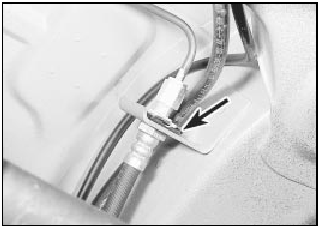Brake fluid pipes and hoses - removal and refitting
Caution: Refer to the precautions in Section 1.
Removal
1 To remove a flexible hose, always free it
from any mounting bracket(s) first by prising
out the U-shaped retaining clip, and then
using two close-fitting spanners to disconnect
the hose-to-rigid pipe union (see illustration).

26.1 Flexible hose-to-rigid pipe union. U-shaped retaining clip arrowed
2 Once disconnected from the rigid pipe, the flexible hose may be unscrewed from the caliper or wheel cylinder union, as applicable.
Refitting
3 When reconnecting pipe or hose fittings,
note that the seal is made at the swaged end
of the pipe, so do not continue to tighten a
union if it is tight, yet still stands proud of the
surface into which it is screwed.
4 A flexible hose must never be installed twisted, but a slight “set” is permissible to give it clearance from adjacent components.
This can be achieved by turning the hose slightly before fitting the U-shaped retaining clip to the mounting bracket.
5 Rigid pipelines can be made to pattern by motor factors supplying brake components.
See also:
Rear suspension front mounting (Saloon, Hatchback and Estate models) -
renewal
1 Chock the front wheels, jack up the rear of
the vehicle and support on axle stands placed
under the side members.
2 Unscrew and remove the three bolts
securing the relevant front guide plate to ...
Rear roadspring (Van models) - removal and refitting
Removal
1 To remove the single leaf type rear
roadspring from the Van, raise the rear of the
vehicle and support it securely under the body
members (see “Jacking and Vehicle Support”).
Support th ...
Major body damage - repair
Where serious damage has occurred or
large areas need renewal due to neglect, it
means that completely new sections or panels
will need welding in, and this is best left to
professionals. If the d ...
